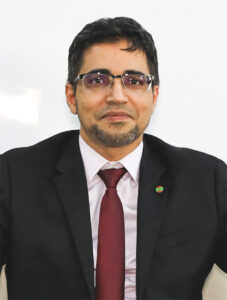
27 Nov Setting the agenda for digital transformation
Rapid development of high-standard digital infrastructure is a strategic imperative for Mauritania’s government
Digitalization is a priority for Mauritania’s government, which established a dedicated Ministry of Digital Transformation, Innovation and Modernization of the Administration in 2021. The following year, this ministry launched the National Digital Transformation Agenda 2022-2025, a strategy based on four axes: digital infrastructure, digital government administration, support for the transformation of economic sectors, plus ebusiness and innovation. In the following interview, the man heading the new ministry, Mohamed Abdallahi Louly, discusses his priorities within the national agenda and the progress the country has made toward digitalization.

Mohamed Abdallahi Louly, Minister of Digital Transformation, Innovation
and Modernization of the Administration
When the agenda was published in 2022, Mauritania had one international submarine fiber-optic connection with a second planned, about 2,500 miles of fiber-optic backbone and a mobile network coverage rate of 95%. How crucial is the construction of additional digital infrastructure for the country?
Our status regarding infrastructure is much better than it was in 2019. Our main urban areas now have 4G, with some telecoms operators having full 4G capabilities and a good level of bandwidth. The challenge is for the rest of the country, and it is critical for the main regional capital cities. Out of our national agenda’s four strategic directions, the first priority is digital infrastructure. We need to do a lot of work to develop infrastructure, which is the most challenging aspect of our digital transformation, because we have a very expansive country and we need to cover some areas that present many challenges to provide remote communities with broadband access.
We are going to invest at least $30 million over the next two years in fiber backbone projects that ensure we have inclusive high-speed internet in every major densely populated area of the country, and we are making significant advances on this road. For instance, I recently presented a project that will cover Mauritania’s entire south and southeast borders. We have designed it to be able to provide 4G services by building on the nation’s existing fiber backbone and it will utilize an innovative renewable energy technology. This is a good example of the type of infrastructure project we want to construct. Its design and implementation is being financed through a government fund, the first phase starts this year and it should take about seven to nine months to execute.
Many other projects are still to come and we are in discussions with Mauritania’s main national operators to accelerate the development of our infrastructure, which is a strategic imperative.
Where does digitalizing government services rank in your list of priorities and how advanced is Mauritania in this area?
Developing a set of e-government services is the second element of our national agenda and some have already been deployed. We are starting with governmental administration services, and have digitalized 12 out of 26 ministerial departments for mail processing services so far. We are putting an emphasis on value for money, which requires significant efforts toward integration, change management and change of leadership, if needed, to deliver our targeted results. This project will be finished by the end of the year and it will reduce some tasks’ completion time from two days to one minute.
An additional e-government service we are in the process of introducing is the ability for customers to track the processing of their requests. We are focusing on three ministries: justice, education and health. In education, we have already eliminated 500,000 requests that people were submitting. Previously, to enroll children in schools people had to request a document from a government agency and then submit the same document to another department. That is no longer the case. Now, we have an automatic, integrated system that sends the information from department to department. This has removed hassle and backlogs and is an example of what digitalization with value can bring the country.
We are also working with the Ministry of Health to create an integrated, central, electronic health record and to accelerate the digitalization of processes in hospitals and other medical facilities. Many more digitalization projects will be forthcoming, which are outlined in our national agenda. Again, our mindset in executing the agenda is focused on value. If something doesn’t bring value, then we don’t spend money on it.
In September, you presented a new Startup ACT Mauritania bill to the country’s Council of Ministers. What part does this play in your plans to boost innovation in the economy?
Our strategy for innovation is focused on three main pillars. One is the Startup ACT and the idea behind it is strong and effective, but simple. We are creating a label for Mauritanian startups with innovative products or services and potential to grow. The startups that obtain this label will receive support from the government, increased access to public markets, tenders and facilities, plus special incentives on import duties and taxation. This label will be issued in a publicly transparent manner, it will create a virtuous competition to obtain it and it will vastly improve the quality level of our startups.
The second pillar is IBTIKAR, a dedicated science and technology park that will cater to Mauritania’s technology needs and the Startup ACT’s future ecosystem. The third is an innovation fund. We have targeted innovation through three pillars as a comprehensive approach to extracting effective, measurable value from innovation.
Education is a major focus of the government. How is digitalization being utilized to enhance the education system?
Education is an important subject that we are addressing on two fronts. The first concerns our development of digital infrastructure: by providing good bandwidth, you immediately open access to education, which can now be obtained online. You can access a free, high-quality course at the Massachusetts Institute of Technology, for example, when you have a good internet connection. We are also working closely with the Ministry of Education on the digitalization of education. Currently, we are supporting them regarding the authenticity and credibility of certificates and diplomas, how to digitize exams, an initiative for digital schools, and providing digital platforms with curricula content and connectivity.
On the other front, we have a center dedicated to training in digital technology, which supports the institute of the Ministry of Higher Education and Scientific Research. We also deliver many capabilities, including 10 gigabyte internet access, to the University of Nouakchott. The “icing on the cake” in our education program is that we will soon launch two masters’ of excellence in artificial intelligence and robotics, which will enable us to compete in the global knowledge economy.
US investments in Mauritania so far have focused on the oil, gas and mining industries. What opportunities are available in the digital sector that you would like to highlight?
We really want to see more investment from the US in our digital infrastructure. High-quality infrastructure is the key to everything. Additionally, we are targeting big players in information technology such as Microsoft, Amazon and Google to establish a first-class data center in the country and we would be very happy to engage in discussions about that — Mauritania needs to fulfill all the requirements to have secure cloud-based public services. We aspire to be the second, or third, country in Africa to host a high-standard public cloud infrastructure data center like they now have in South Africa, and we could channel its capacity through the Sahel countries.
What would be your message to potential investors in all sectors of the economy?
Mauritania has a strategic location and very important security and stability features. Digitalization enhances our attractiveness — it makes the country a place where investors can come to invest.
